This is how Bing works with ChatGPT, first contact
- February 14, 2023
- 0
Microsoft was not lying last week when it introduced the new Bing with a “tuned” version of ChatGPT that the beta phase will start very soon. Just yesterday
Microsoft was not lying last week when it introduced the new Bing with a “tuned” version of ChatGPT that the beta phase will start very soon. Just yesterday

Microsoft was not lying last week when it introduced the new Bing with a “tuned” version of ChatGPT that the beta phase will start very soon. Just yesterday we told you that the company started sending out the first invitations, and just 24 hours later and a week after the introduction of Prometheus, we already received an invitation to prove everything that indicates that this is the future of information searches on the Internet.
I waited for the message, although the truth is that I had no objective reason to think that I would be among the first users to receive an invitation (although it is true that I followed some of the steps that were recommended to speed up access to the beta), which is why I remained more vigilant than usual about the email account I used to sign up for the waiting list. I checked a few times yesterday after the news of the first invites went out, but it was now, 24 hours later, when I finally got the invite.
Clicking on the invitation email button will not take you directly to the new Bing, but to page with information about him and some examples in case you lack inspiration when you start trying it out. Also, if the default browser on your PC is not Microsoft Edge and the page opens in it, you will be prompted to use the Microsoft browser to test the beta version. However, those from Redmond have confirmed that it will be added to other browsers later.
The modified page will arrive finally time to access the search engine, for which it’s fastest to type www.bing.com into the Edge address bar. In this way, it will show the interface that we could already see in the leaks from more than a week ago and confirmed last Tuesday with the official presentation. In it, the traditional search bar was replaced by a larger field, with the text “Ask me anything” and a maximum capacity of 1,000 characters. If you scroll down, you’ll find the rest of the elements that typically appear in your customized browser settings.
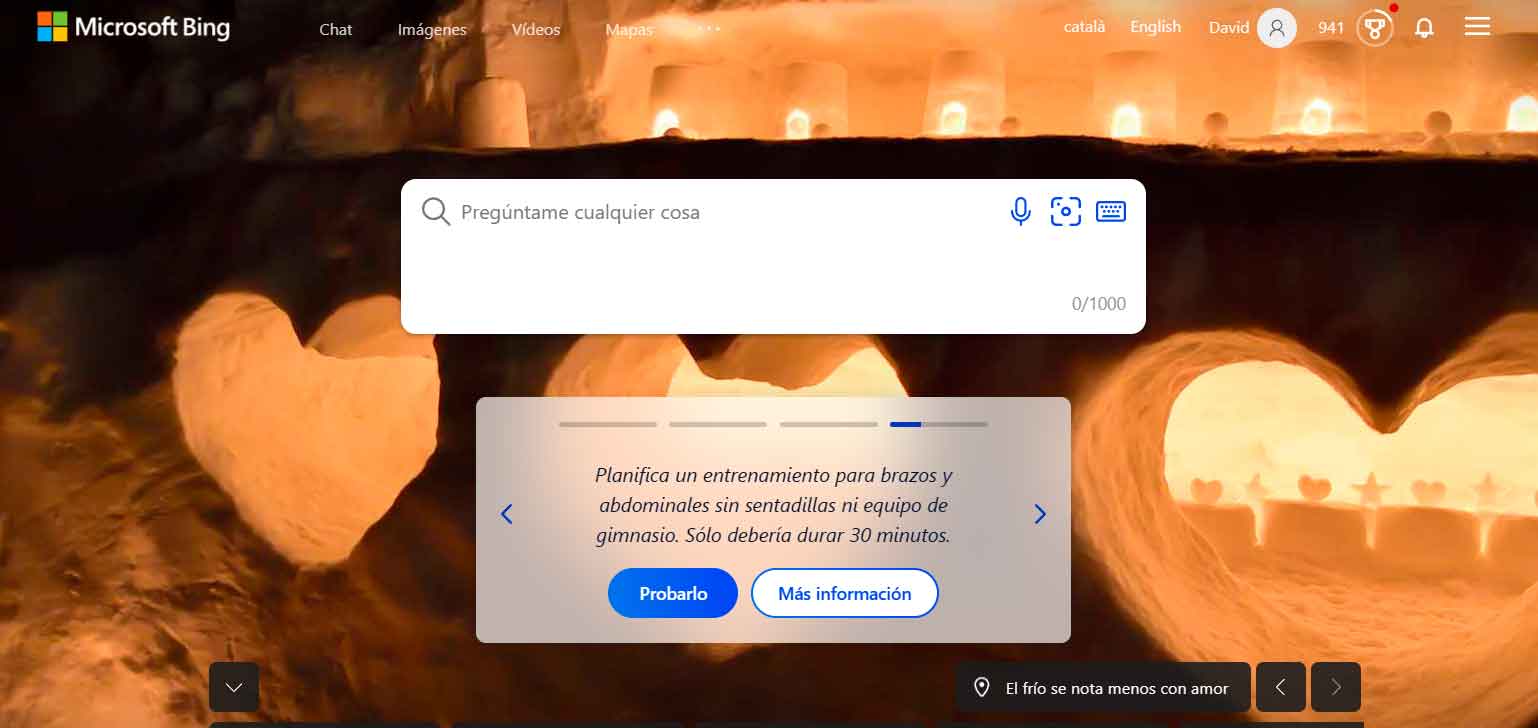
Of course, as you can see, the general background that was shown in these images is replaced by striking and beautiful photos that usually form the background of the browser. So it’s time for the first consultation and the first thing that comes to mind is to ask about the distance between Earth and Mars. I add a couple of sub-questions, to check if it answers them, I press enter and at that moment I’m surprised because this is displayed:
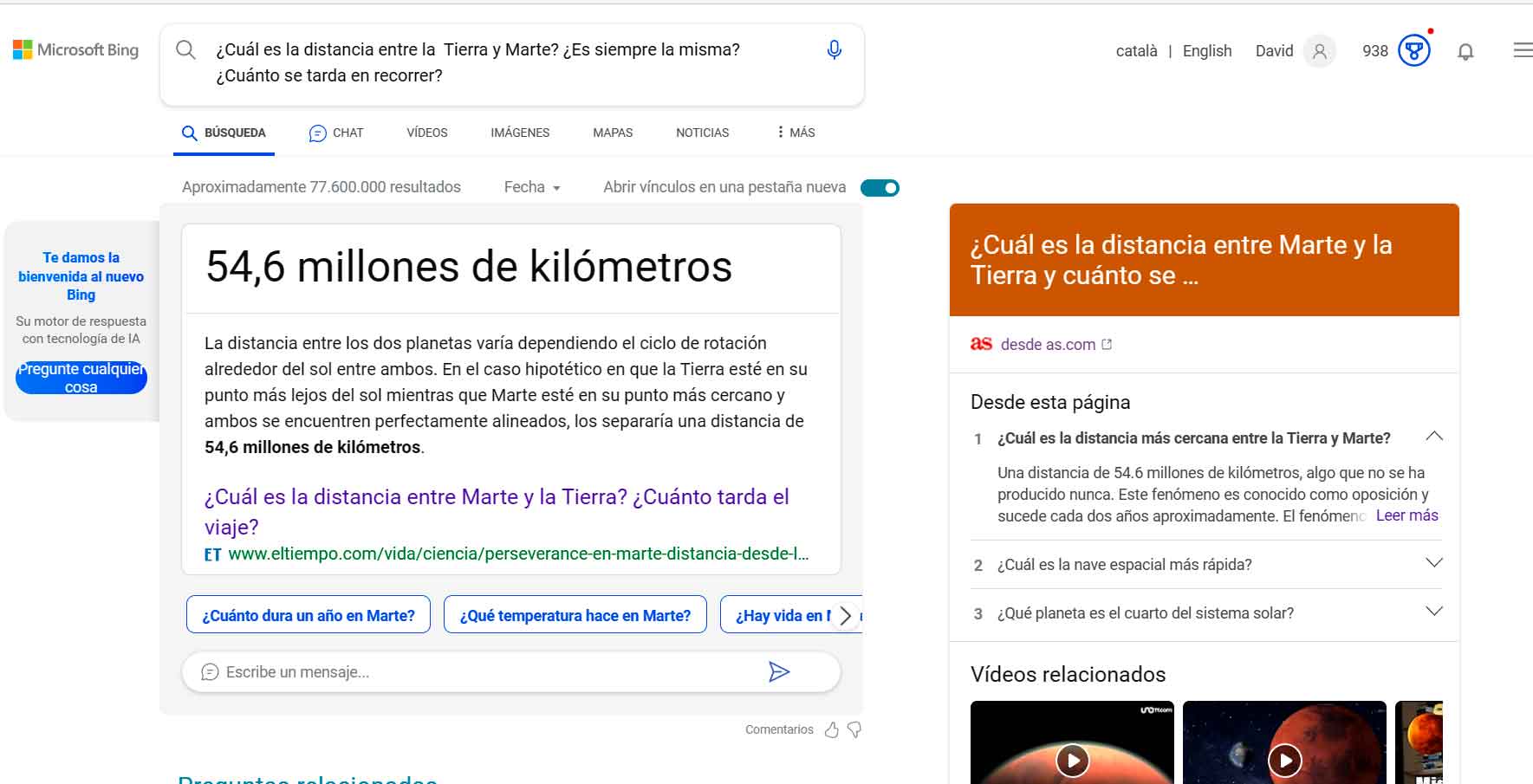
What happened? Did I do something wrong? What I see is a results page, similar (or almost similar) to what the “old” Bing showed me.. However, there is a difference that you can see on the left side of the page and also when we look at the bar shown on the results that allows us to choose the type of results that we want to consult, we see that the item “Chat” so what corresponds is to click on her and see what happens, right?
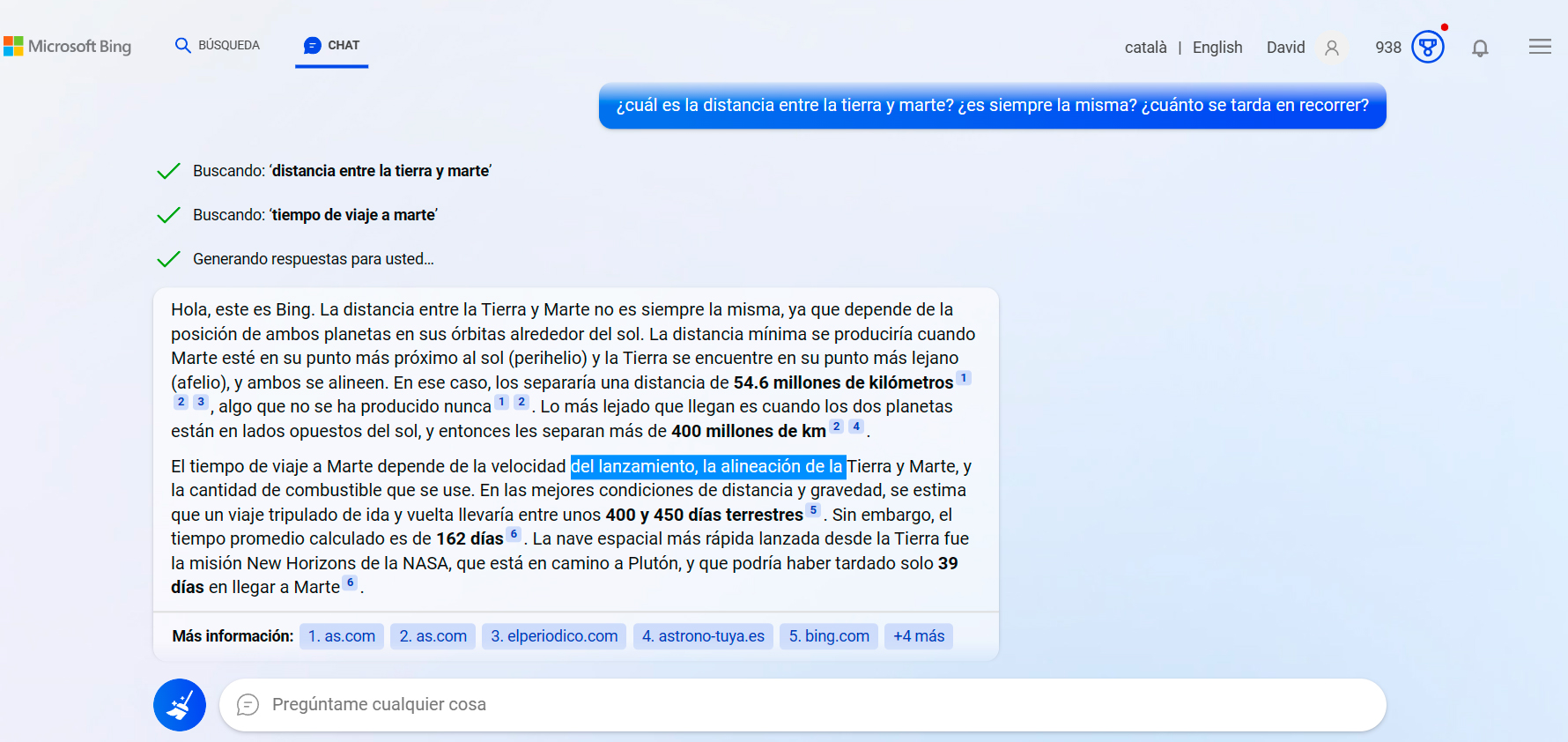
That’s something else! Now I see what I expected ie. a text mode answer to my question as well as links to the sources used to create said answer. Of course, this allows us to verify that the information Bing provides us is real, or at least that it comes from sources that have a reputation for being reliable. This point is not at all trivial. On the contrary, one of the most worrying aspects of chatbots is their tendency to invent answers without indicating that they are doing so. However, by clearly identifying the sources, this problem is almost completely mitigated.
In addition, of course, we still have access to the “traditional” results page, so when in doubt, if we want more information or wish for any other reason, we can scroll down the page to go there.
The distance between Earth and Mars is a common question, quite general. What’s more, I bet I was far from the first person to pick up on the new AI-powered Bing. That’s why I think it will be interesting to ask you a less common question, which I already know the answer to, but I don’t think it’s common. So after thinking about it a bit, I ask him “Do you know MuyComputer?”. This is his response:
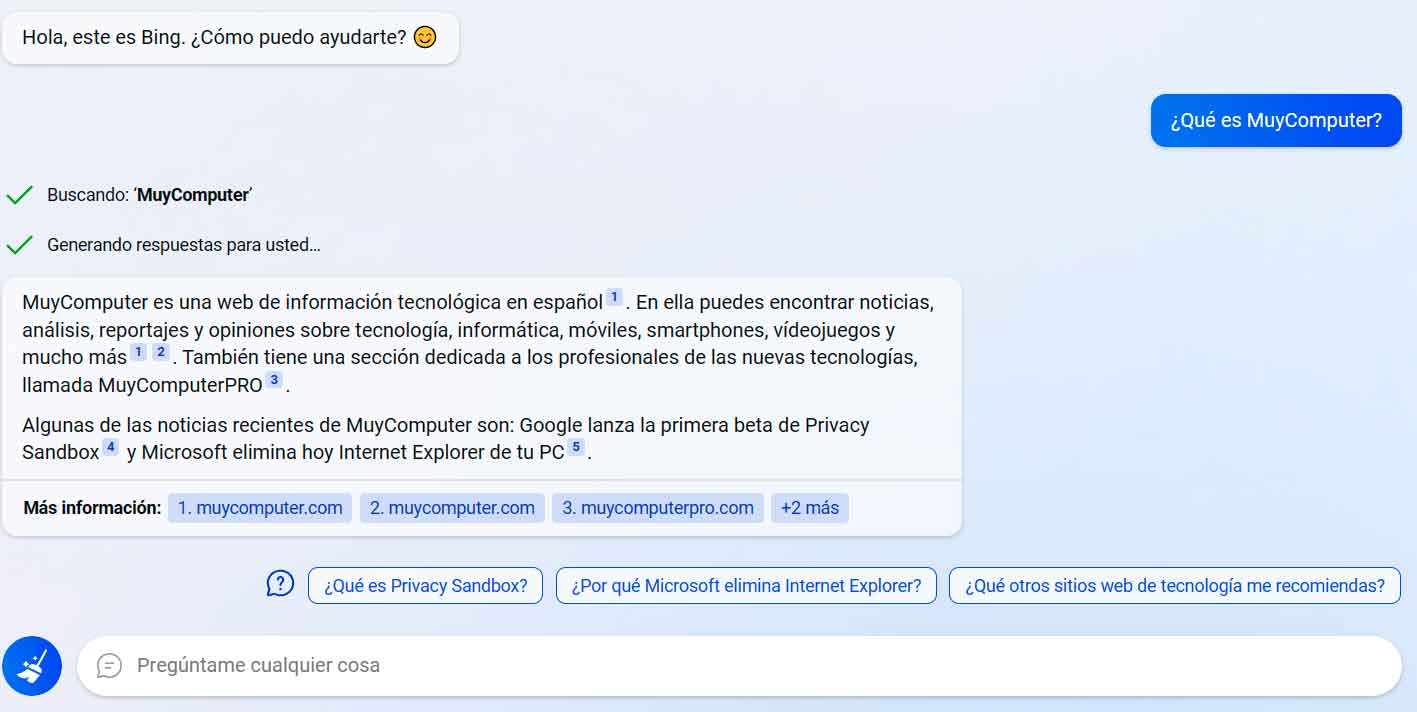
MuyComputerPRO is not actually a part of MuyComputer, but a sister website devoted, as Bing rightly states, to the professional field. Now, did you look carefully at the answer? Isn’t there something that catches your eye? In fact, the two MuyComputer news he links to are the ones we posted last, just before writing and posting this one.
This is undoubtedly another very remarkable aspect, because unlike ChatGPT, which only updates periodically (not constantly) and which, as it states many times, does not have an Internet connection, Bing with Prometheus does, it is constantly updated, constantly, so is able to provide us with up-to-date information about the requests we implement. Again, an element that gives more certainty when you opt for this new information search format.
Therefore, encouraged by this verification, I decide to ask you a question on the topic of the latest news, the new European public DNS that we informed you about yesterday. This is what he replied to me
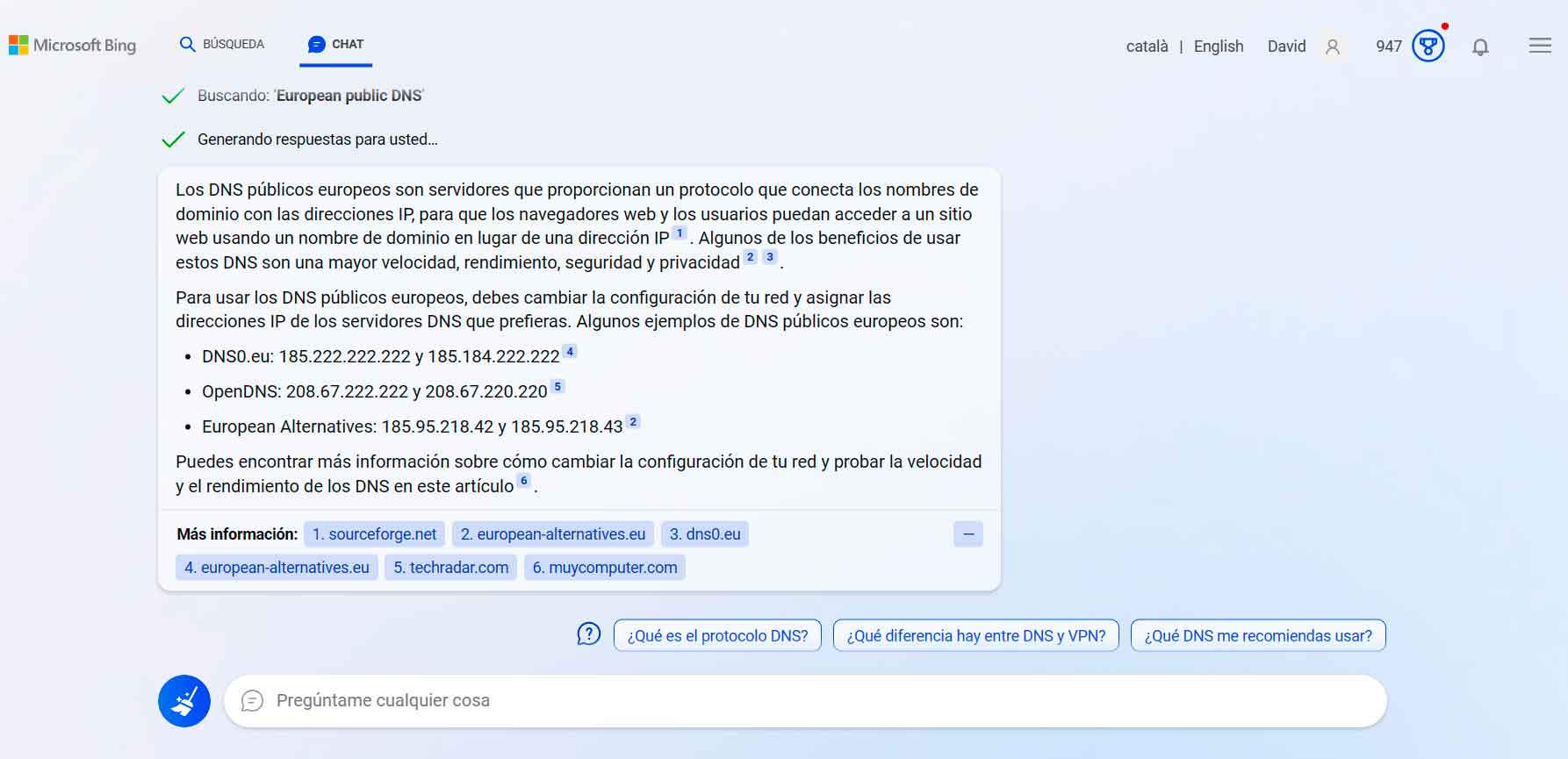
In this case we find lights and shadows. The negative is that although he talks about European public DNS, he interpreted it as “public DNS servers that can be used in Europe” instead of understanding that I mean those recommended by the European Union. However, in this case we can understand that there is a lack of context and that the recommendation is quite new, so it is possible that the model cannot yet identify this particular fact.
Positive again we find references and sorry for the collective immodesty and the fact that I recommend our yesterday’s article to users who want to expand their information about it. Without a doubt, you have chosen an unbeatable resource in this case.
I’m making this first contact with the new Bing with Prometheus, but I’ll no doubt continue to explore its uses, its strengths, and of course, its seams over the next few days. However, I have to say it the first impression was quite positive and that the idea that the (near) future of information seeking is passing through this new paradigm seems successful to me. However, it is still too early to draw any in-depth conclusions, so it is best to continue testing.
Already testing Bing with Prometheus? And if so, what is your experience with the results and format? And whether you try it or not yet, do you think it will be a format for information seekers in the future?
Source: Muy Computer
Donald Salinas is an experienced automobile journalist and writer for Div Bracket. He brings his readers the latest news and developments from the world of automobiles, offering a unique and knowledgeable perspective on the latest trends and innovations in the automotive industry.